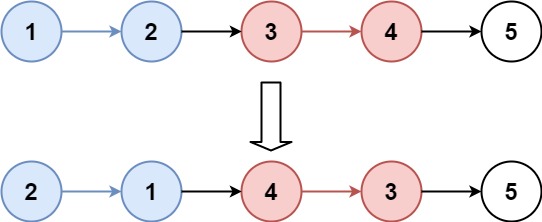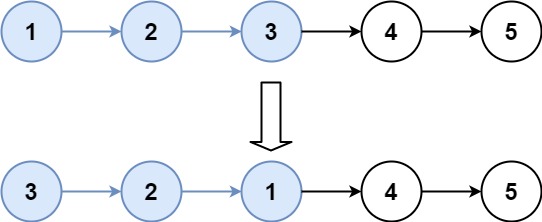Given the head of a linked list, reverse the nodes of the list k at a time, and return the modified list.
k is a positive integer and is less than or equal to the length of the linked list. If the number of nodes is not a multiple of k then left-out nodes, in the end, should remain as it is.
You may not alter the values in the list’s nodes, only nodes themselves may be changed.
Example 1:

Input: head = [1,2,3,4,5], k = 2 Output: [2,1,4,3,5]
Example 2:

Input: head = [1,2,3,4,5], k = 3 Output: [3,2,1,4,5]
Constraints:
- The number of nodes in the list is
n. 1 <= k <= n <= 50000 <= Node.val <= 1000
Follow-up: Can you solve the problem in O(1) extra memory space?
SOLUTION
public class ReverseNodesInKGroup {
public ListNode reverseKGroup(ListNode head, int k) {
// Base condition
if (head == null || k == 1) {
return head;
}
// Dummy node before head
ListNode dummy = new ListNode(-1);
// Point the next of this dummy to the current head
dummy.next = head;
// Node to keep track of the previous node
ListNode previous = dummy;
// Variable to keep count of the nodes in the linked list
int count = 0;
// Reference to the head which will be used to traverse
ListNode current = head;
while (current != null) {
count++;
if (count % k == 0) {
previous = reverse(previous, current.next);
current = previous.next;
} else {
current = current.next;
}
}
return dummy.next;
}
private ListNode reverse(ListNode start, ListNode end) {
// Previous node of the current node
ListNode previous = start.next;
// Current node
ListNode current = previous.next;
// Next node of the current node
ListNode next;
// Loop for the whole interval
while (current != end) {
// Next node of the current node
next = current.next;
// Next of current will point to the previous
current.next = start.next;
// Current node will become the previous node
start.next = current;
// Move pointer ahead
current = next;
}
previous.next = end;
// Return head node of the reversed linked list
return previous;
}
}

